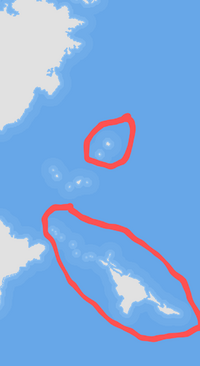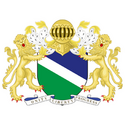New Gough Island
Country of New Gough Island | |
|---|---|
| Anthem: The Great New Gough Island | |
 | |
| Status | Recognised as a country of Riamo with independence in foreign relations de jure; operating as an independent state under Riamese protection de facto (since 1980). |
| Capital | Port Victoria |
| Largest | Hartridge |
| Official languages | Common |
| Recognised regional languages | Gough |
| Ethnic groups (2024) | White (74%) Black (12%) East Asian (8%) Native (4%) Mixed Race (2%) |
| Religion (2024) | Non Religious (47%) Christan (45%) East Asian Religions (5%) Native Gough Religions (2%) Other (1%) |
| Demonym(s) | New Gough Islander |
| Government | Unitary Executive lead Democracy under a federal constitutional monarchy |
• Monarch | Diana II |
• Chief Executive | Helen Zealand |
• Vice Chief Executive | Richard Wright |
| Legislature | National Assembly |
| Country of Riamo | |
• Arrival of the First Colonists | 1609 |
• Self Governed Colony | January 1, 1955 |
• Recognition of independence in foreign relations | July 8, 1980 |
| Area | |
• | 60,528 sq mi (156,770 km2) |
• Water (%) | 0.8 |
| Population | |
• 2024 census | 6,587,000 |
• Density | 108.8/sq mi (42.0/km2) |
| GDP (nominal) | 2024 estimate |
• Total | ACU 204.297 Billion |
• Per capita | ACU 31,000 |
| Gini (2024) | 34.6 medium |
| HDI (2024) | very high |
| Currency | New Gough island Hull (NGIH) (NGIH) |
| Time zone | New Gough Island Time |
| Date format | mm/dd/yyyy |
| Driving side | left |
| Calling code | +53 |
| Internet TLD | .ng |
New Gough Island officially the Country of New Gough Island or less commonly known, The State of New Gough Island is a country in the southern hemisphere. The country is made up of a large island and a smaller islands. As of the 2024 census, the nation's population stood at 6.587 million. The country has a land area of 60,528 sq mi. The capital city is Port Victoria. While the largest city is Hartridge. The half of the country's population lives on the highly populated South Sound and South East Regions which are home to the largest city and capital city. While the country is highly mountainous along the west and south west coasts and forested with some rolling hills. The climate of the country is temperate, with some spots in humid subtropical and tropical climate zones.
History
Demographics
Largest City Proper in New Gough Island
2024 Census | |||||||||
|---|---|---|---|---|---|---|---|---|---|
| Rank | Region | Pop. | |||||||
 Hartridge  Gough City |
1 | Hartridge | South Sound | 254,000 |  Parsides City  Jarvis Bay | ||||
| 2 | Gough City | South Sound | 207,000 | ||||||
| 3 | Parsides City | Parasides Islands | 191,000 | ||||||
| 4 | Jarvis Bay | North Coast | 179,000 | ||||||
| 5 | Port Victoria | South East | 154,000 | ||||||
| 6 | Gladen | South Sound | 135,000 | ||||||
| 7 | Golden | South West | 120,000 | ||||||
| 8 | Berman | South Sound | 108,000 | ||||||
| 9 | Westberg | South East | 101,000 | ||||||
| 10 | New Verdun | West Coast | 87,000 | ||||||
| Historical population | ||
|---|---|---|
| Year | Pop. | ±% |
| 1730 | 10,000 | — |
| 1750 | 50,000 | +400.0% |
| 1800 | 200,000 | +300.0% |
| 1820 | 780,000 | +290.0% |
| 1850 | 968,000 | +24.1% |
| 1870 | 1,380,000 | +42.6% |
| 1880 | 1,900,000 | +37.7% |
| 1890 | 2,250,000 | +18.4% |
| 1900 | 2,700,000 | +20.0% |
| 1910 | 3,180,000 | +17.8% |
| 1920 | 3,808,000 | +19.7% |
| 1930 | 4,290,000 | +12.7% |
| 1940 | 4,800,000 | +11.9% |
| 1950 | 5,090,000 | +6.0% |
| 1960 | 5,175,000 | +1.7% |
| 1970 | 5,300,000 | +2.4% |
| 1980 | 5,520,000 | +4.2% |
| 1990 | 5,820,000 | +5.4% |
| 2000 | 6,050,000 | +4.0% |
| 2010 | 6,190,000 | +2.3% |
| 2020 | 6,430,000 | +3.9% |
| 2024 | 6,587,000 | +2.4% |
Geography
The geography of New Gough Island is quite diverse. The major geographic features are the Western Alps, the Northern Coastal ranges and the Southern coastal ranges. As well as the Eastern plains and the West Coast Rainforest, the New Gough Island forest and the tropical Parasides Islands.
Climate
Administrative Divisions
Regions
| Name | Population | Land Area | Population Density | Capital | Largest City |
|---|---|---|---|---|---|
| South Sound | 2,240,000 | 7,400 sq mi | 302.7 people per sq mi | Gough City | Hartridge |
| West Coast | 299,000 | 19,557 sq mi | 15.3 people per sq mi | New Verdun | New Verdun |
| Parasides Islands | 770,000 | 1,837 sq mi | 419.2 people per sq mi | Parasides City | Parasides City |
| North Coast | 1,730,000 | 9,900 sq mi | 174.7 people per sq mi | Jarvis Bay | Jarvis Bay |
| South East | 1,100,000 | 8,834 sq mi | 124.5 people per sq mi | Westberg | Port Victoria |
| South West | 448,000 | 13,000 sq mi | 34.5 people per sq mi | Golden | Golden |
Government
Politics
2020 New Gough Island General Elections
Supreme Court
National Assembly
President and Cabinet
Transportation
Education
Economy

